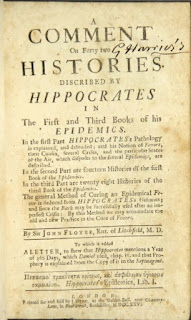As we come to accept that the great covid-19 pandemic which started off as an epidemic is slowly becoming endemic, it's worth noting the new additions to our vocabulary. These words that were likely "all Greek to you" before 2020, are indeed just that -- they are all in fact derived from ancient Greek!
The word epidemic was in use since at least the time of Homer which is around 600 BCE, and is mentioned in the Odyssey to mean "who is back home" or "who is in his country." However, it was first introduced to medical jargon, along with its closely associated words pandemic and endemic, by the ancient Greek doctor, Hippocrates.
 |
| Hippocrates' treatise on Epidemics |
 |
| Evolution of the term Epidemics. Credit: Paul Martin |
And not just these but several other words that we have come to associate with the current pandemic (as well as other diseases) were also coined by Hippocrates and his medical school such as:
- Cytokine
- Chronic
- Resolution
- Peak
- Acute
- Crisis
- Relapse
- Convalescence
- Prefix: my/mys (muscle)
- Combining form: o
- Root: cardio (heart)
- Suffix: itis (inflammation)
And the list of Greek-derived words for medical conditions goes on and on:
- arthritis
- nephritis
- bronchitis
- hepatitis
- bursitis etc.
In fact, it is estimated that three-quarters or 75% of all medical terminology are of Greek origin.
And it's not just Greek; several Latin words are also used in medical vocabulary, like abdomen, anus, medication, capitation, cranium, and cerebellum, to name just a few. So next time you come across a complex medical term that makes little sense, you know who to blame (or admire, if you are a Classics geek like me!)
Comments
Post a Comment